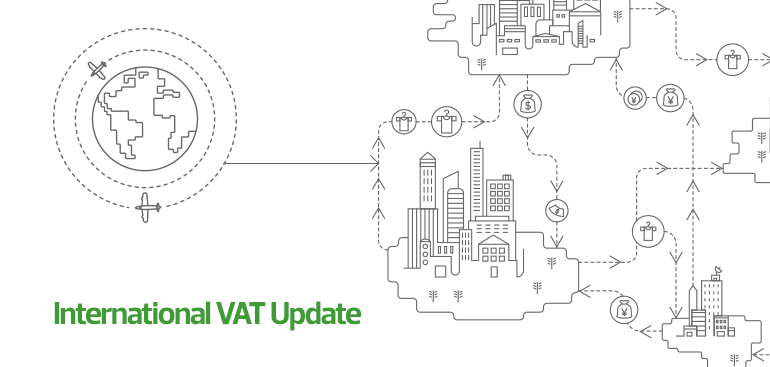Breaking VAT news from around the world, including updates from the Netherlands, Hungary, Switzerland, US and Australia. Download here or read below.
ireland
Brexit and Potential impact on Irish VAT rates
The current standard rate of Irish VAT is 23 percent. The rate was increased by 2 percent to this rate with effect from 1 January 2012, as a financial emergency measure following the domestic financial crisis.
Following the Brexit vote by the UK electorate, there have been calls from influential lobby groups in Ireland to cut the standard rate of Irish VAT from 23 percent to 20 percent in the upcoming 2018 Budget, to make the rate more competitive with the UK rate. Belfast is a 1.5 hoursr drive from Dublin. Retail groups in particular point towards Ireland’s high standard VAT rate as a contributory factor for lost sales to UK retailers by way of cross-border shopping by Irish consumers. The high rate of VAT is also sighted as a factor in the growing trend for online shopping, which is predominantly fulfilled by businesses operating outside of Ireland, albeit this ignores the fact that sales from EU business are likely to fall within the distance selling thresholds.
VAT is a significant funding mechanism for the exchequer, the burden of which is seen as fair and equal in its application. This factor, coupled with pressure for cuts in other area of taxation policy, means any change to the standard rate is unlikely.
There has also been debate on the efficacy of the reduced rate of 9 percent which applies to services provided in the tourism sector. Up until May 2011, the rate for this sector was 13.5 percent (the rate was reduced to boost the industry during the economic recession). The rate was initially expected to revert back to 13.5 percent at the end of 2013. However, the Irish Government have extended the deadline with the 9% rate remaining in place, in all Budgets since 2013.
A number of economists are calling for the 13.5 percent rate to be reintroduced. This stance arises from the current state of the Irish economy, which has sharply recovered in the past three years to become one of the fastest growing EU economies, with hotel occupancy rates at saturation. On the other hand, the tourism industry argues the retention of the 9 percent VAT is key to boosting the sector which is competing strongly with overseas destinations, and in particular, to assist the sector in areas outside of Dublin.
In Budget 2017, the rate was retained for another year, one of the key factors signed by the Minister of Finance being to protect the sector in times of uncertainty surrounding Brexit, as the UK market is one of the most important sources of revenue for the industry. This could change in the upcoming October Budget.
What this means
Irish tourism businesses will clearly need to watch the forthcoming Budget with interest. In general terms, the lobbying being undertaken in Ireland regarding the VAT rates is symptomatic of the very close links, not least of course in terms of geography, between the UK and the Republic of Ireland – and the relationship between the two, including the potential reintroduction of a land border between the countries is one of the key topics in the Brexit negotiations.
As well as retailers, all businesses with activities in both countries will need to consider the impact of the Brexit options as they affect both countries, in ensuring that any resulting VAT cost is properly mitigated
Seán McCarthy, RSM Ireland
NETHERLANDS
VAT adjustments in the property sector
The Dutch government has recently published a bill to expand the current VAT adjustments requirements for ‘capital items’ where the taxable use of the items in question changes over the capital items adjustment period (currently nine years for immoveable property and four years for certain tangible capital assets). Changes to the VAT adjustment rules are expected to take effect from 1 January 2018. From that date the value of ‘capital services’ will need to be included in any adjustments (such as renovations and refurbishments) in order to prevent unacceptable tax avoidance.
What this means
Dutch businesses particularly in the property sector will undoubtedly have greater administrative requirements as a result of this change, particularly those with a changing ration of taxable and exempt supplies. Further analysis of capital projects will need to be undertaken to assess whether renovation and refurbishment projects are likely to be within the new regulation.
It is still unclear as to whether, and to what extent, there will be transitional arrangements and what, if any, impact it will have on refurbishment projects that have already taken place or will be in progress at the point at which the new regulations take effect. It is hoped that further guidance will be published accordingly
Bart Ploum, RSM Netherlands
Hungary
Real time invoice reporting
The Hungarian government has issued further details about the real time invoice reporting requirements due to be introduced in Hungary from 1 July 2018.
Customers receiving invoices from businesses operating in Hungary above HUF 100,000 (approx. EUR 320) will be required to report them in real time “without delay, but within 24 hours at latest” to the Hungarian tax authorities (‘HTA’), according to the newly published draft of the Regulation by the Ministry of National Economy. Businesses will be required to register their invoicing software and the communication termination point and all data communication between the taxpayer and the HTA will be done via this electronic communication protocol. The Regulation draft suggests that HTA will soon open the electronic communication registration for testing purposes, so that business will have enough time to prepare for the real time invoicing obligation.
What this means
Any Hungarian VAT registered entity that issues invoices with a VAT amount above HUF 100,000 (approx. EUR 320) is affected by the real time invoicing obligations. This includes businesses established outside Hungary but registered for VAT in Hungary.
Failure to report the invoices in real time mode may attract an administrative penalty of up to HUF 500,000 (EUR 1700) per invoice so it is important that due consideration is given to the new rules.
Companies will need to make invoicing software capable of real time data transfer by 1st of July 2018 at the latest. This is a one year extension compared to the previous plans to introduce the real time reporting from 1 July 2017.
The new real time reporting obligation will be closely linked to the existing obligation to provide data in the XML format (also known as Standard Accounting File or SAF), although the xsd scheme may change over time. We recommend reviewing your SAF export function and extending it further to satisfy the new requirement.
Daniel Sztanko, RSM Hungary
Switzerland
Significant changes in VAT to enter into force on January 1, 2018
Foreign businesses carrying out activities in Switzerland should prepare for a significant revision in the VAT rules meaning that they will need to consider a potential mandatory VAT registration where they might not have previously been required to do so. The authorities have moved to remove a competitive disadvantage currently felt by Swiss-resident businesses.
The competitive disadvantage comes from the current legislation that allows foreign companies to avoid invoicing VAT for their supply of goods in Switzerland provided that their annual turnover in Switzerland stays under the threshold of CHF 100,000, but this is not possible for Swiss companies who have a worldwide turnover of more than CHF 100,000. With the revised VAT Act, the foreign company’s worldwide turnover will be decisive for deciding whether there is a mandatory tax registration and not merely its turnover in Switzerland. The turnover limit of CHF 100,000 remains. Consequently, many companies will be liable to VAT and will have to face a mandatory registration to Federal Tax Administration, appoint a tax representative in Switzerland, make a short term deposit directly at the tax administration or present a bank guarantee, file quarterly VAT returns and prepare annual reconciliation between the turnover of the company and the VAT returns completed.
Alternatively, irrespective of the level of turnover, companies will be exempt from a tax liability if they are based aboard and exclusively supply services subject to VAT in Switzerland under the reverse charge mechanism (but does not apply to those supplying telecommunication or electronic services Switzerland to recipients who are not liable to VAT).
A further forthcoming revision to the Swiss VAT code will impact mail-order companies selling goods on a business-to-consumer basis and is due to come into force on January 1 2019. From that date, mail-order companies will be liable to VAT if their annual turnover from small consignments that are imported tax-free in Switzerland reaches at least CHF 100,000. Consequently, such companies will have to register to Swiss VAT and to the Swiss VAT to the customer. As a result, the customers will no longer have to pay the taxes and fees levied by Customs upon import. Moreover, mail-order companies will be required to provide a deposit to the VAT administration to cover any legal claims.
What this means
These changes are among a number of revisions to the Swiss VAT code which are on the horizon. Businesses with activities and interests in Switzerland should consider them carefully and ensure they take the necessary action to meet their compliance requirements in the light of them.
Daniel Spitz, RSM Switzerland
United States
Proposals for a Border Adjusted Tax Dropped
In a recently released joint statement on tax reform, US Republicans have confirmed that the contentious border adjustment tax (BAT) will no longer be included in their tax reform framework. As the only member country of the OECD without a wholesale VAT or GST, the United States administration had considered whether a BAT would be a way of boosting US competitiveness.
Originally proposed in the House Republican Tax Reform Blueprint released last June, the BAT has been the topic of much debate as discussions on tax reform have progressed. Operating as a destination-based tax, and therefore drawing comparisons with other indirect tax systems, the BAT would generally exempt exports while subjecting imports to tax and was the cornerstone of the Ways and Means Republican tax reform plan – projected to raise approximately $1 trillion in revenue. The recently issued joint statement by Government representatives, however, has made it clear that tax reform would move forward without the BAT.
The statement provided, among other things, a high- level outline of the goals of tax reform moving forward. Included in these goals were rate reductions, “unprecedented capital expensing,” priority on permanence, and the return of American jobs and profits back from overseas.
What this means
Despite the high-level nature of the Republican statement it is clear that it now believes that all of the goals proposed could be accomplished without the need for a transition to a destination-based tax (such as that provided for by a BAT). Accordingly, in order to advance tax reform, border adjustability would be set aside.
Moving forward, the border adjustment tax would no longer be a factor in the shape of tax reform to come. Future tax proposals coming out of the US in the light of this development will be monitored with interest
Julia Summerville, RSM US
AUSTRALIA
Rule change for Inbound Intangible Consumer Supply (“IICS”) providers to Australian consumers
New rules took effect from 1 July 2017 which have expanded the Australian Goods and Services Tax (“GST”) base so that IICS delivered to ‘Australian consumers’ from locations outside Australia (i.e. Business-to Consumer supplies (“B2C”) will be subject to Australian GST at a rate of 10%.
These new rules ensure that the following types of supplies will be brought within the Australian GST net: foreign delivered movie streaming or downloading services; music; apps; games; e-books; and other digital products. In addition, other remotely supplied services such as consultancy and professional services will also be caught.
IICS will only be subject to Australian GST where the supply is made to ‘Australian consumers’. For this purpose, an ‘Australian consumer’ is any person who is not GST-registered, including GST-unregistered businesses and charities. Remote IICS made to GST-registered persons in Australia, which are of a personal nature or not connected with the person’s GST-registered enterprise will also be subject to the new rules.
Remote IICS made to Australian GST-registered consumers will not be caught by these new rules. The existing reverse charge rules will continue to apply, with the GST-registered Australian recipient responsible for any potential Australian GST liability. There is a limited safe harbour protection for non-resident suppliers – if an ‘Australian consumer’ provides the non-resident supplier with its Australian Business Number, and declares it is GST-registered, the non-resident supplier can rely upon the declaration and not account for Australian GST.
Where a foreign supplier is responsible for the Australian GST obligations in making IICS to Australian consumers, it will be required to register, charge, collect, and remit GST to the Australian Taxation Office.
Where the IICS are made through an electronic distribution platform (“EDP”), then the operator of the EDP will be deemed the supplier, and will have to attend to the Australian GST obligations. An EDP operator will always be the deemed supplier if the operator does any of the following:
- authorises the charge to the customer;
- authorises the delivery to the customer; or
- sets the terms and conditions under which the supply is made.
Where the EDP operator does not do any of the three matters above, the foreign supplier (actual supplier) will be responsible for discharging the Australian GST obligations.
A new limited registration regime has been introduced which will make it easier for the foreign supplier (a Limited Registration Entity (“LRE”)) to register in Australia for GST purposes.
Under the LRE regime - Business Activity Statements (“BAS”) can only be lodged on a quarterly basis, no input tax credits are permitted, no Australian Business Number (“ABN”) will be issued and tax invoices are not required. However, it must be noted that the LRE regime is elective, therefore if the foreign supplier wants to claim input tax credits, or to obtain an ABN, it can stay with the standard registration process.
What this means
These new rules have brought the Australian GST system in to line with the OECD’s International VAT/GST guidelines, and will reflect the ‘destination principle’; that is, taxation in the jurisdiction where consumption occurs. Those providing the relevant services should take note of the new rules and take the necessary action to remain compliant
David Rumble, RSM Australia








